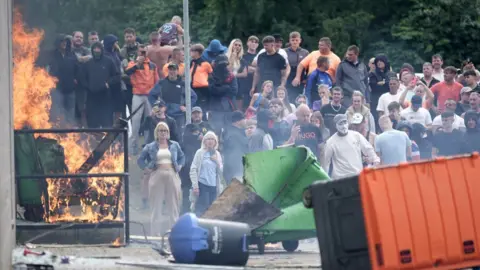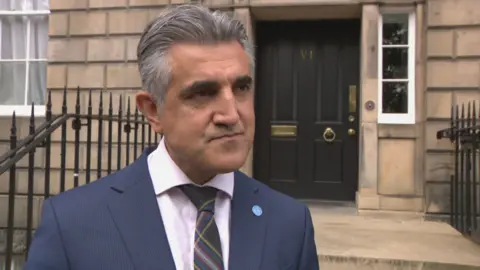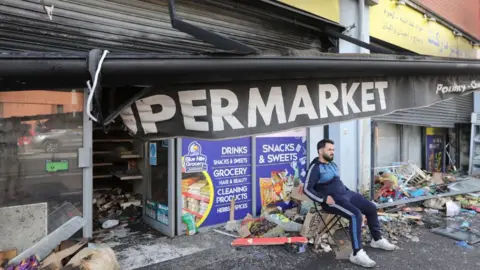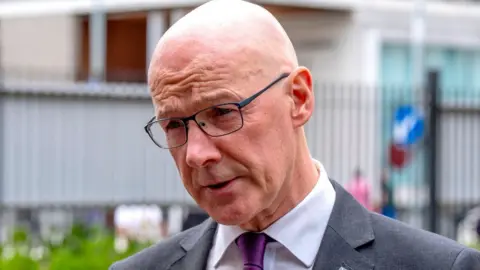 Getty Images
Getty ImagesPeople in the asylum system in Scotland are living in “constant fear” following days of violent riots in other parts of the UK, the chief executive of the Scottish Refugee Council has said.
Sabir Zazai told BBC Scotland News that some people in communities his organisation works with were scared to go out.
The BBC understands some groups have planned protests and counter protests north of the border in the coming weeks.
Police Scotland said any disorder will be “identified quickly” and “responded to immediately”.

The force dismissed speculation of a protest in Glasgow’s George Square earlier.
Mr Zazai spoke following a meeting with faith leaders and First Minister John Swinney at Bute House.
On Tuesday, former First Minister Humza Yousaf, who is of Muslim faith, said he questions whether he and his family have a future in Scotland or the UK due to Islamophobia.
Mr Zazai said there was “lots of anxiety and uncertainty” among communities the Scottish Refugee Council works with.
“These people are fearful already, they have fled dreadful situations,” he said.
“We don’t want them to be retraumatised.”
The charity chief said Scotland was “fortunate” not to have seen riots but warned “nowhere is immune to racism”.
He told BBC Scotland News: “Yesterday we had somebody living in an asylum hotel saying should I stay in the hotel or should I leave?
“We’ve had other people worried about their wellbeing, people not being able to travel to their appointments with their lawyers or getting advice from us and others.
“This should all be avoided and that shouldn’t happen, people should not feel that insecurity and fear in our streets.”
 Getty Images
Getty ImagesCounter demonstrations in Scotland have been organised after far-right activist Tommy Robinson posted about a “pro-UK” rally to be held in Glasgow’s George Square next month.
The English Defence League founder, whose real name is Stephen Yaxley-Lennon, had earlier promoted false claims about the Southport attacker.
Mr Zazai said that misinformation about the violent riots “is damaging to everyone”.
The Muslim Council of Scotland said it has “full trust” that police protection in Scotland is strong enough following disorder elsewhere.
Mr Swinney said he was “very concerned” about the riots in other parts of the UK.
After meeting with faith leaders and Scottish political party chiefs, the first minister said they wanted to send a message of solidarity, adding: “Violence plays no part in our society, that the Islamophobia that we’ve seen has no place in our society and that we’ve got to stand together in representing cohesive communities in Scotland.”
 Getty Images
Getty ImagesMr Swinney also met with Chief Constable Jo Farrell and Assistant Chief Constable Gary Ritchie in Edinburgh.
Police Scotland Assistant Chief Constable Gary Ritchie said they understood the disorder in other parts of the UK was causing concern and the force is running “enhanced patrols and direct engagement” to provide reassurance to communities.
“We continue to closely monitor the situation to ensure any potential for violence or disorder in Scotland is identified quickly and responded to immediately,” he said.
“We are aware of a number of potential protests, and counter protests, over the coming weeks, which will be policed appropriately but we are not going to speculate on or add publicity to individual potential events.
“I would also encourage everyone to be responsible in their use of social media and not to share speculation or inaccurate information.”
More than 400 people have been arrested, and 100 have now been charged, in connection with violent scenes in towns and cities such as Rotherham, Middlesbrough and Bolton over the weekend.
There has been further disorder in London, Plymouth and Belfast.
In Tamworth, Staffordshire, a hotel used to house people in the asylum system was targeted by rioters using petrol bombs and fireworks.
The violence followed the fatal stabbing of three girls in Southport. Subsequent unrest has been fuelled by online misinformation relating to the attacker.




